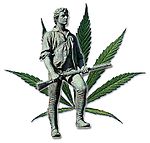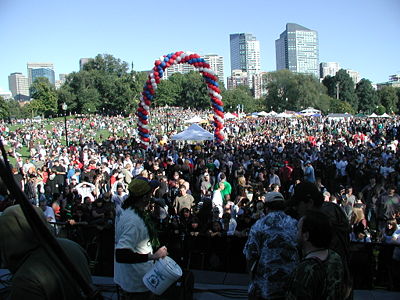- MASS CANN/NORML
-
Massachusetts Cannabis Reform Coalition state affiliate of NORML 
Type Public Education Organization Founded 1990 Location POB 0266, Georgetown, Massachusetts, 01833-0366 USA Key people Steven S. Epstein, Esq., Bill Downing, Keith Saunders, PhD. Area served Massachusetts Focus Legalization or decriminalization of marijuana in Massachusetts Website Official MASS CANN/NORML Website The ‘”Massachusetts Cannabis Reform Coalition'" a state affiliate of the National Organization for the Reform of Marijuana Laws (also known as ‘”MASS CANN/NORML’” or ‘”MC/N’”) is a non-profit public education organization working for the moderation of marijuana laws. MASS CANN/NORML hosts the Freedom Rally on Boston Common every third Saturday in September. The MC/N newsletter is Mass Grass, which is published six times annually. Membership is open to the public and leadership is democratically elected at the annual winter membership meeting, usually held in March.
Contents
History
MC/N was founded October 21, 1990 by Steven S. Epstein, Linda Noel, Madelyn Webster, Gary Insuik, John Miqliorini, Therese Slye and Ron Massad. Linda Noel was the first president and was also active with the High Times Freedom Fighters. Steven Epstein was the first clerk and Madelyn (Maddy) Webster was the first treasurer. In 1991 Dave Getchell was elected president, but after just a few months Dave handed the job to Bill Downing who served as president until 2004. Steven Epstein, an attorney, was elected treasurer in 1991 and remains treasurer to this day.
MC/N’s organizational mission is: '“To educate the public and raise public awareness in the Commonwealth: about the history of Cannabis Sativa’s cultivation and uses in Massachusetts and the potential uses of the plant, Cannabis Sativa, L., as a natural, renewable and ecologically sound source of food, animal feed, fuel, fiber, textiles, paper, medicines, chemicals presently derived from wood, coal, natural gas, petroleum and other renewable and non-renewable resources, and it’s use as a recreational and spiritual substance…”'. To those ends MC/N leaders and members have written, published, spoken, debated, marched, rallied, organized, donated, illustrated and otherwise volunteered in numerous ways.
MASS CANN/NORML Events
Some MC/N events include:
- Co-sponsorship of two Harvard Law School conferences on drug policy, first on May 18, 1991 and second on May 21, 1994.
- A July 11, 1992 protest and march in Chelmsford, Massachusetts in opposition to the taking of the Farmer family residence by forfeiture.
- Tax Day protests from 1994 until 1998, calling for the taxation of regulated marijuana sales, held at the last post office open in the state on Tax Day, the Boston Postal Annex. At one of those protests hundreds of ounce bags of marijuana seed were thrown to the crowd.
- Annual Boston participation in the Global Marijuana March from 2004 on.
- Benefit shows in rock clubs around Boston.
As was mentioned above, MC/N organizes the Freedom Rally which is held on the third Saturday in September on Boston Common. It is traditionally the second largest annual gathering demanding marijuana law reform in the United States, after the Seattle Hempfest. MC/N has successfully sued the City of Boston for permits for the Freedom Rally three times.

MC/N has virtually no overhead costs. They have no personnel or offices. Every action of MASS CANN/NORML is done by volunteers.
The MASS CANN/NORML board of directors and officers were honored as High Times Freedom Fighters of the Month.
Various sub-chapters of MC/N have been formed over the years. While others have not persisted, the University of Massachusetts Amherst Cannabis Reform Coalition (UMASSCRC) lives on strong .[1] Their annual spring Extravaganja rally on Amherst Common has grown in popularity over the years and will be held for two days this year.
MASS CANN/NORML Partners on Legislative Work
In the 1990s MC/N worked closely with the "'ACLU-Massachusetts Drug Policy Task Force"' and the "'Massachusetts Coalition for Medical Cannabis"' or "'MCsquared"' on legislative issues including:
- Passage of the Bertonazzi bill: An act creating a marijuana therapeutic research program in the Massachusetts Department of Public Health, passed by the legislature and signed into law by the governor in 1992. It is codified at M.G.L. c. 94D.[2] Over 14,000 signatures were gathered in this effort
- Passage of the Joe Hutchins Act: A medical necessity defense for the possession of marijuana which was signed by Governor William Weld in August 1997. It is codified at M.G.L. c. 94C, s. 34.[3]
In 1999 MASS CANN/NORML activists formed the Committee for the Reform of Marijuana Laws (CRML) in support of a proposed statewide ballot initiative that would decriminalize adult possession of marijuana in Massachusetts. Though the all-volunteer signature drive gathered over 20,000 signatures, it fell short of the required 57,000 and the initiative effort was abandoned.
Beginning in 1996 MASS CANN/NORML activists targeted state senatorial and representative districts with public policy questions on local ballots. These non-binding ballot questions were run in districts where the senator or representative held sway over and stood in opposition to medicinal cannabis or decriminalization legislation. The questions, when approved, told the legislator to introduce and support medicinal cannabis or decriminalization legislation. The legislators were free to disobey these directives from their constituencies (as they are non-binding), but by doing so would demonstrate disrespect for the wishes of the voters.
Eventually public policy questions were run in 41 districts. Some were run by former MASS CANN/NORML board members who formed the Drug Policy Forum of Massachusetts (DPFMA).[4]
Every one of the 41 public policy questions run up until now has passed with an average of 63% of the voters in support (almost 2 to 1).[5] The results from these public policy questions caught the attention of the Marijuana Policy Project and inspired their funding of a statewide decriminalization ballot initiative. That initiative passed by a comfortable 30+ point margin (34.8% opposed; 65.2% for).[6]
See also
- NORML
- Drug Policy Alliance
- Legality of cannabis
- Removal of cannabis from Schedule I of the Controlled Substances Act
- Marijuana Policy Project
- Multidisciplinary Association for Psychedelic Studies
- Students for Sensible Drug Policy
- DrugWarrant
- Illegal drug trade
- Law Enforcement Against Prohibition (LEAP)
- November Coalition
- Prohibition of alcohol
- Americans for Safe Access
- CA Senate Bill 420
Notes
- ^ "Official UMASSCRC Website". http://www.umasscrc.org/main/.
- ^ "Bertonazzi Bill". http://www.mass.gov/legis/laws/mgl/94d-2.htm.
- ^ "Joe Hutchins Act". http://www.mass.gov/legis/laws/mgl/94c-34.htm.
- ^ "Official DPFMA Website". http://www.dpfma.org/home/.
- ^ "Public Policy Question Results". http://www.masscann.org/legal-reform/cumulative-public-policy-question-results/60-politics/90-cumulative-public-policy-question-results.
- ^ "Massachusetts results". The Boston Globe. November 5, 2008. http://www.boston.com/news/politics/2008/election_results/ma_question2/.
External links
Cannabis General Preparations Usage Effects Short-term · Long-term (dependence · withdrawal · respiratory disease) · Cannabidiol · Cannabinoids · Delta-9-tetrahydrocannabinol (Δ9-THC) · Endocannabinoid systemNotable strains Acapulco Gold · BC Bud · Holland's Hope · G-13 · Kush · Netherlands Weed · Northern Lights · Panama Red · Quebec Gold · Skunk · White WidowOrganizations Culture Categories:- Drug policy organizations based in the United States
- Organizations established in 1990
- Cannabis legal reform in the United States
Wikimedia Foundation. 2010.
